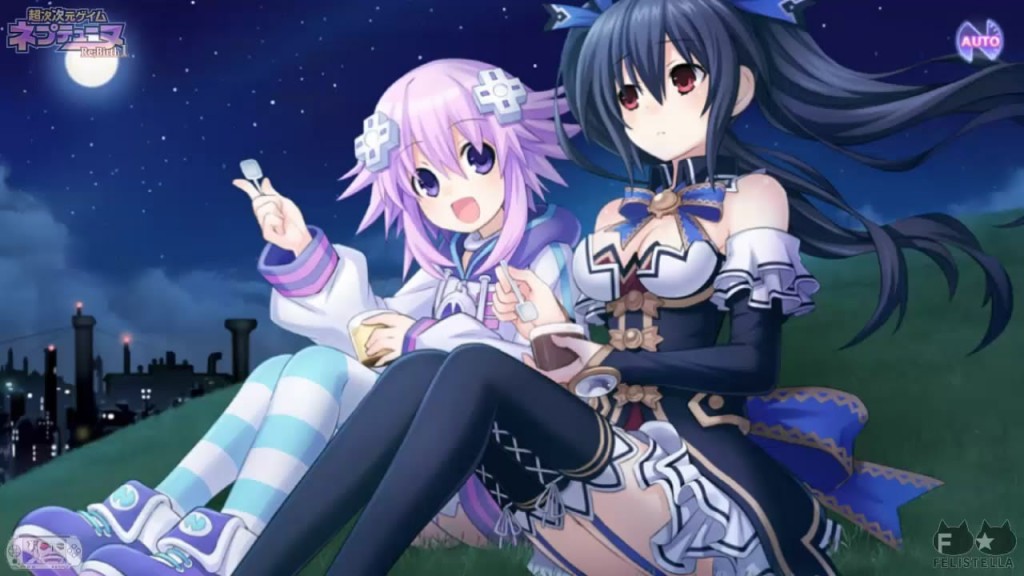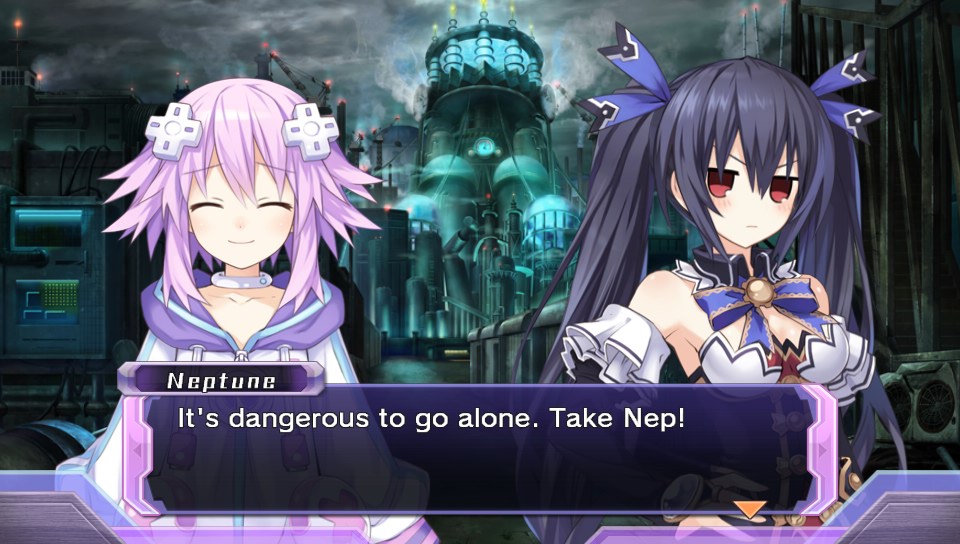Last time, I remarked how little of the series’ reputation seemed to appear in its moment-to-moment mechanics. Now, having cleared about a third of the game, I can talk more in-depth about it. That’s about ten hours or so, for you folks with no perception of JRPG length.
For the most part, you can tell Compile Heart worked on the game with an entirely limited budget. In the Re;birth remake released on Steam, literally every “cutscene” consists of two hyper-cute anime girls talking to each other with a variety of different facial animations and expressions. For the most part, any kind of exposition and humor comes primarily through these scenes, which go on and on in the worst possible way for the vast majority of the gaming audience. Oddly enough, considering that about 75% of the dialogue has absolutely nothing to do with that silly satirical plot about the inner workings of Gameindustri (yes, it’s rather on the nose), that’s why I continue to sit through them.
Really, the whole point of those scenes, and why I would guess people continue to play through them, is personality. Rarely do JRPG protagonists display this level of characterization. No “chosen heroes” or “magic girls” or JRPG tropes tend to exist in this world; rather, Neptunia likes to borrow anime cliches instead, but throws you just enough off balance to deny your brain the familiarization of categorization. Noire acts like the typical tsundere, for example, and while that development isn’t unexpected, she is also the embodiment of the Playstation brand: constantly ambitious, ahead of itself in the development of superior technology, and (in my opinion) prone to pride and hubris. As well, she’s an otaku, which means she’s less than enthusiastic about revealing her love of cosplay (many such people in the West would feel the same, I suspect!).

Vert, the Xbox stand-in, is a giant barrel-chested (no surprise) gamer who would, apparently, rather play video games online all day that actually be a goddess of an entire nation. She’s just happy-go-lucky, although not to the point of silliness, and maybe a little too amorous towards certain people. These don’t seem like interpretations, either, but intentional bits of character attributes and ideas. Hyperdimension Neptunia appeals to the anime crowd, no contest, but it also knows what buttons to push, how “meta” to get, and how to make gamers feel both smart and rewarded for picking up on all the little “video game culture” references in the dialogue. To list them would tire me out, I assure you! And that comes with the realization that, really, I actually am playing a game with 50% of the entirety being a visual novel. Never say never, folks! Imagine that, me playing a game where people talk for 10-15 minutes at a time. I didn’t even change the language to Japanese, since the dub actually works pretty well.
So simply put: the characters are characters that I will probably remember, which is a testament to the writers and localizers equally. At least, that holds true if you can handle Japanese media. In general, though, the characters don’t exist just for the sake of fanservice or (admittedly hilarious) sexual innuendo. I imagine this will remain a point of contention for the vast majority of the audience who might find themselves interested (males especially) in the game. Don’t let that dissuade you, though; if you can handle most teen-focused anime shows, then this one won’t phase you in the least. Gameindustri is a fun place to hang out, all said.
I think I keep returning to the 1 Samuel 16:7 because it is perfectly representative of this game’s effect on me. I do not love “cute” things, nor would I call myself anything but a heterosexual male (the fact that we have debates about the fluidity of gender, just for example, is not a conversation I will ever have). Yet, I can’t help but enjoy myself in this really strange, really weird world full of fun people. If God calls for unqualified people to send his messages, then you can imagine God will speak to you in the weirdest places too. Don’t let reputations and appearances fool you! Sometimes, they end up being false.

Of course, that would deny that there’s an actual game underneath all this very light-hearted fun. In a phrase, Neptunia plays like an old-school dungeon crawler. Do you like grinding? Fighting lots and lots of semi-random battles against the same foes over and over again? Leveling up a whole lot just to stand a chance against the boss at the end? Well, then you’re in the market for this! I can see why reviewers hated the game’s earlier iteration so much – you need to fight, a lot. The combat, on the other hand, isn’t all that boring and can prove pretty fascinating for the micro-manager in us all.
Battles take place in a 3D plane where enemies and allies move. Each character can move a certain radius per turn, and each character’s weapon shows, on screen, the range (width and depth) of their weapon strikes. Attacking an enemy (or multiple) with your weapon will bring up the “Attack” options, which consists of Rush, Power, and Break. Each one takes up a certain number of Action Points (AP), which determines how much they can attack. The first option performs a series of rapid attacks which build up the EX Gauge (more on that later), but does little damage. The Power moves take out tons of physical damage, assuming the enemy’s armor gauge has been depleted. The Break moves, as you might suspect, break through enemy armor. As you go through the game, each character learns additional abilities in those combo strings, and can edit them at will based on a character’s strengths. Some are simply better at dealing damage than others, so you’ll emphasize their Power attacks above all else; you can fill in the blanks for the rest. As well, the traditional spell/items appear, although you must be in range of the character or foe to use them.
While you can overcome most obstacles through grinding, some bosses and regular enemies would require TONS of it to succeed. You’re better off learning good positioning to avoid having your party bite the dust. Since the game relies on the old Save Point idea, you don’t want to die after an hour of grinding; this gives you a similar level of caution like Dragon Quest games, in that they only contain one save point. Additionally, there’s no “heal all” or “tent” item, nor the use of restorative spells outside of combat, so you need to think long and hard whether you can survive the current dungeon. These are the kind of basics you’d expect from a challenging JRPG, but Neptunia does them quite well compared to its contemporaries.
